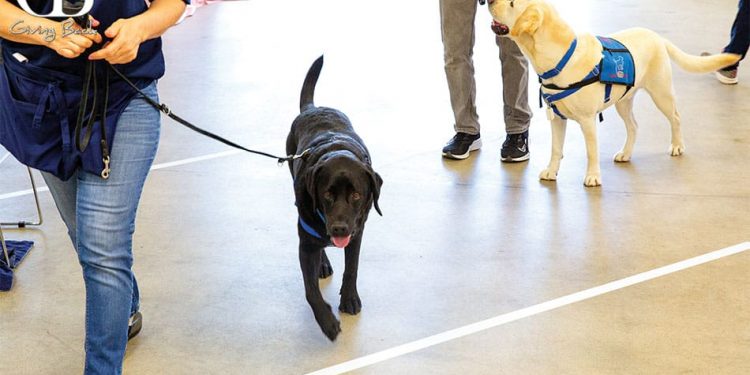Military

Freedom Dogs
Lending A Paw To Marines In Need
When it comes to supporting military members in need, Freedom Dogs is here to help. The San Diego based non-profit organization works closely with the Marine Corps at Camp Pendleton, providing specialty service dogs to wounded warriors suffering from post-traumatic stress disorder, traumatic brain injury, and/or other physical impairment. Freedom Dogs give both physical and emotional aid to wounded warriors making the transition back to civilian life, or in some cases, returning to active duty.
Freedom Dogs offers two types of programs: The Partner Program, which pairs a dog and trainer team to a service member to complement their recovery process, and the Partner for Life Program, which matches a dog to a warrior for life.
Trainers have been working together for many years, with multiple trainers being with Freedom Dogs from its onset. Specializing in positive reinforcement instruction, the trainers encourage the dogs to think on their feet and problem solve.
Beth Russell, the founder of Freedom Dogs shared with GB Magazine, “It is not uncommon to hear someone ask, ‘can your dog do…’ and have the trainer say, ‘no, but give me five minutes and he will.’ This is possible because our trainers have given our dogs a firm foundation. They can then build new behaviors in minutes. Over 90 percent of our trainers are Karen Pryor Academy graduates.”
But it is not all about dog training. The trainer also works with the service member, building a trust-based bond that lasts a lifetime. A trainer may get a call anytime, day or night, if their particular Marine needs help. Freedom Dog trainers often make trips to their participant, and spend many hours listening, training, and helping their Marine. These bonds continue even after the participant leaves the military or a dog is placed with an owner. “The trainers are told countless times, ‘you saved my life!’” Russell shared.
All trainers in the organization use a program called STEPS. It instructs how to train specialty service dogs, as well as work with service members. As they advance, the trainers take on additional responsibilities. “How one moves along and progresses depends on the trainer’s understanding of the needs of the participants and the dogs that serve them,” Russell said.
Freedom Dog trainers are skilled individuals who also collaborate with others in the program to ensure the dogs and participants have the best outcome. Freedom Dogs trainers are known in the community for working together and asking for help when needed. “Though it takes a lot of work and time, being a Freedom Dogs trainer is an incredible and rewarding vocation. It takes a special person, but when it’s the right fit, it is awesome,” Russell said.
Freedom Dogs is always looking for new trainers and volunteers. Those interested can call (760) 696-3076. For more information on the Freedom Dogs organization, visit www.FreedomDogs.org.





